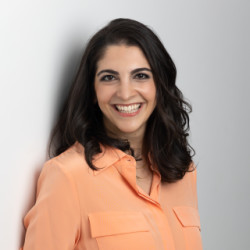Seven months into my first job as an oculoplastic surgeon, I found myself sitting across from two federal agents in my boss’s office.
The situation would have been inconceivable to me when I began looking for jobs during the summer between my first and second year of fellowship training.
This position had been posted on the American Society of Ophthalmic Plastic and Reconstructive Surgery website for over a year when I first noticed it. My husband and I had decided we would preferentially relocate near our favorite city after my fellowship, which unfortunately happened to be one of the most competitive areas to seek job opportunities. I had my heart set on remaining in academia, but given the paucity of available positions, I had to accept the likelihood that I would end up in private practice.
Dr. A was a senior oculoplastic surgeon who had started his practice decades before and steadily grew it to the point of needing a younger surgeon to relieve an existing backlog of consultations and surgeries. The position had been previously filled by another young oculoplastic surgeon who had left due to family obligations on the opposite coast. We arranged to conduct an in-person interview at his practice, but my fellowship schedule only allowed for two call-free weekend days per month, so we chose a Saturday.
On the day of the interview, Dr. A pulled into the parking lot in a cherry-red Porsche convertible. He walked me through the empty office and inquired about my salary requirements. Later, he and his wife, who also served as his office manager, wined and dined me and my husband at a fancy waterfront country club. I left the evening with an inexplicable uneasiness about the obvious displays of wealth and his slick communication style. While outwardly charming, there was something about Dr. A that filled me with distrust.
I dragged my feet on accepting the position, hoping that my job search would yield other options in the area. I resolved not to sign the contract unless he allowed me to speak with the junior surgeon who had previously occupied the position. By that time, my fellowship was nearing an end and my husband was anxious for me to accept the job so that he could secure a position in the same area. Dr. A provided me with the junior doctor’s contact information, and when I called him he confirmed that his only reason for leaving the practice had been family concerns requiring him to relocate geographically. He denied any red flags about the practice.
As the job hunt continued to come up dry, I reluctantly signed the contract in the spring of my final year of fellowship, with plans to begin at the end of the summer. My husband and I purchased our first home in the area where we would both be starting our new jobs. During my first week at the practice, I shadowed Dr. A in the office while I waited for the completion of my insurance credentialing. Dr. A had a small designated in-office AAAA space and the procedures of the day were posted on the door. I looked at the schedule and noticed that the entire day was filled with orbital explorations, which I found puzzling, having just finished training at a tertiary care center where we would do a maximum of one or two of those in a whole day and always in a fully equipped OR. Dr. A must have noticed my confused expression as he said, “Don’t worry about that. That’s just something we do to get paid.”
My heart dropped with the realization that my gut feelings about the position had been correct. I immediately began searching for other job opportunities, though my husband was concerned that word might get back to Dr. A and I would suffer professional consequences for looking to leave the job so soon. He argued that as long as I did not engage in fraudulent behavior myself, my license would be safe, but I feared that it would only be a matter of time before I was pressured to behave similarly.
Sure enough, shortly after I was credentialed and started treating patients on my own, Dr. A called me into an exam room for a private discussion. He insisted that I change my documentation and coding to reflect higher complexity surgeries than I was performing, arguing that the individuals who reviewed the charts were not intelligent enough to know the difference and that private practices had high overhead expenses to cover, which I would not understand coming from an academic setting. When I expressed concerns over patients having to pay higher fees, he remained unmoved, responding that they were seeing specialists and understood they would have to pay more.
Despite being repeatedly approached by Dr. A, his billers, his wife, and the surgical schedulers, I refused to change my documentation and billing patterns. When it became clear I would not capitulate to their demands, Dr. A threatened my position, stating that I was not earning my salary. As the threats escalated, I spent countless hours feeling unsafe and concerned I was being spied on, waiting for the day that I would lose my job altogether. I suffered countless sleepless nights and friction in my home life, desperately leaning on every professional resource I had to find another job in the area where we had purchased our first home.
Fortunately, in my darkest hours, my efforts at finding another position paid off, and I secured an assistant professorship position at a reputable academic center more than an hour away from our home. I gave my contractually obligated three-month notice and informed Dr. A I was leaving due to my discomfort with the billing practices and pressures to behave unethically. Predictably, he expressed no remorse and urged me to leave sooner than my notice period, though he was unwilling to fire me, likely out of concerns over unemployment benefits and the enforceability of my restrictive covenant.
A few days later, as we worked to reach an agreement, I received a text message from one of my colleagues stating that more than 40 federal agents had raided the main office, boxing hundreds of Dr. A’s charts. My colleague told me that two of the agents were on their way to the satellite office to speak with me, so I waited in Dr. A’s office for their arrival. The following months and years were filled with countless hours of meetings with federal agents and prosecutors and a second intervening indictment against Dr. A, culminating in his pleading guilty to all of the charges against him just before I would have been subpoenaed to take the witness stand in the government’s case.
Though the ordeal was harrowing, I learned some critical lessons that I hope can help young physicians seeking out their first jobs after training.
- Always trust your gut. Part of medical education includes learning to follow your instincts, even if the hierarchical nature of our training leads us to defer to those in higher positions. Had I trusted my initial reservations about Dr. A and the practice, even in the absence of clear knowledge and evidence of what was happening, I would never have ended up in that situation. It is so important not to be afraid of following your intuition, even if it seems terrifying or inconceivable to do so.
- Always visit the practice during business hours to see how doctors, patients, and staff in the practice behave and are treated. Sometimes the rigors and hierarchy of training make it challenging to take the time you need to vet your job opportunities, but insist on doing it anyway. Had I done so in Dr. A’s practice, I would have immediately noticed the unethical behavior and refused the position.
- Always question restrictive covenants. Thankfully, these are becoming less and less draconian, but I found myself in a position where Dr. A had the power to prevent me from practicing 15 miles from each office location for 2 years, meaning I would not have been able to work near my house unless I remained in a practice where I was being pressured to behave unethically and bill fraudulently. While I understand the reasoning behind restrictive covenants from the practice owner’s perspective, there should absolutely be provisions to protect young new surgeons from being held hostage to abusive senior physicians who can use that as leverage against them.
- Seek transparency about collections. Part of what we learned during the investigation was that Dr. A had billed some of our procedures and office visits under himself, thereby reducing our overall collections. It did not impact me as I had a salaried position, but it certainly affected my colleagues who were working on a percentage of collections. Transparency is also critically important if you are considering a future partnership because without it you cannot accurately assess what a practice is worth.
- Be wary of family members working in the practice. Because Dr. A’s wife was the office manager, I had no unbiased avenue through which to voice my concerns. While it may be understandable for a practice owner to want to include family members in his or her business, to maintain a fair and balanced work environment, he or she should always have non-family workers in positions of power to provide a system of checks and balances.
- Forgive yourself. I spent years revisiting my decisions leading up to accepting the position at Dr. A’s practice, often questioning my judgment and wondering how I could have ended up in that position after all the years of training and work I had put into my career. Ultimately, I made what I felt was the best decision available to me at the time, taking into account not just my wishes, but my partner’s wishes as well. Mistakes will happen, and all we can do is use them as learning experiences to improve our decision-making in the future. I am now happily running a successful solo cosmetic practice in a beautiful location, and this is at least partly due to the professional experiences I had and the mentorships I formed along the way.
What were some valuable lessons you learned in your first job that you wish they taught you in med school? Share below in the comments!
Dr. Mahsa Sohrab is an oculoplastic surgeon located in Greenwich, CT. When she is not busy managing her own practice, she enjoys writing, sewing, reading, and globetrotting with her husband and daughter. Follow her on Instagram @drmahsasohrab. Dr. Sohrab is a 2024–2025 Doximity Op-Med Fellow.
Illustration by Jennifer Bogartz







